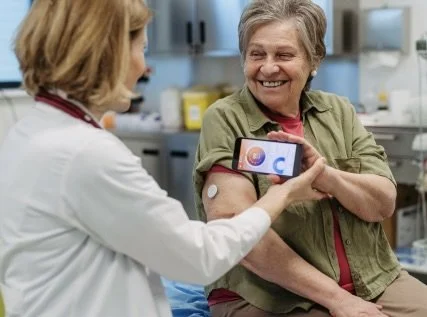How human-centered healthcare research is transforming health and wellness
Why healthcare research needs a human lens
For decades, healthcare research has focused on systems, protocols, and outcomes, but often without the people those outcomes are meant to serve. Human-centered healthcare research flips that paradigm. Instead of studying patients, caregivers, and clinicians as data points, it studies their lived realities. This approach uncovers the emotional, social, and environmental factors that truly shape health outcomes and is redefining what effective healthcare research looks like.
From data to human understanding
At Indeemo, we believe that understanding people in context is where better healthcare begins. Every interaction, whether a caregiver’s midnight routine, a patient navigating a digital portal, or a clinician balancing empathy with efficiency, holds valuable evidence about how health is lived, not just managed.
Traditional research often captures claimed experiences through surveys or interviews. In contrast, human-centered healthcare research uses contextual video, asynchronous diaries, and ethnographic observation to gather evidence as it happens. This creates a more authentic and auditable picture of real-world behavior, the kind of insight that drives innovation, empathy, and regulatory-ready evidence.
The six pathways to human understanding
Through years of qualitative studies, six recurring pathways have emerged, each reflecting how people experience health in everyday life:
Consumer and preventive health
Prevention is not clinical, it is cultural. People sustain health through rituals and micro-routines like vitamins beside kettles or post-workout smoothies. Observing these patterns helps researchers design interventions that fit naturally into daily life.Digital health and devices
Health technology only works when it fits people’s rhythms. From smartwatches to patient portals, human-centered healthcare research explores when digital tools empower and when they exhaust.Diagnosis and acute care
Diagnosis is not a moment, it is a passage filled with uncertainty, emotion, and identity shifts. Capturing these lived experiences helps healthcare teams build communication and trust into every step of care.Treatment and therapy journeys
Treatment does not end at prescription. It is about coexistence and how people emotionally adapt to living with therapy. Indeemo’s longitudinal video diaries make these unseen adjustments visible.Caregiver experience
Caregivers are the hidden infrastructure of healthcare. Observing their routines and emotional load reveals how systems can better support those who support others.Colleague and professional experience
Behind every act of care is a professional balancing empathy and overload. Human-centered methods bring visibility to their emotional and operational realities, ensuring that when professionals are supported, patients thrive.
AI as a supercharger for human insight
Artificial intelligence is not replacing researchers, it is supercharging them. Indeemo’s AI tools accelerate thematic analysis and pattern detection across thousands of minutes of qualitative data while keeping human interpretation at the core. The result is faster, richer insights that remain grounded in authentic voices.
Compliance meets compassion
With HIPAA-aligned privacy features, facial blurring, and PHI minimisation, Indeemo’s platform ensures every insight is regulator-ready and ethically sound. This means healthcare researchers can confidently use human-centered evidence in submissions, studies, and product development without compromising participant dignity or data integrity.
Breaking down barriers to health research
Historically, qualitative research was dismissed as subjective or small-scale. Indeemo’s platform breaks those barriers by combining feasibility, scale, and auditability. Large, diverse populations can now participate securely and asynchronously, turning qualitative insight into decision-grade evidence.
The human is the most advanced sensor
The future of healthcare innovation depends on how deeply we understand the people it serves. As Indeemo’s CEO Eugene Murphy puts it, “In healthcare, the human remains the most advanced sensor.”
When healthcare organisations design with people, not just for them, they do not just build products; they build empathy, trust, and lasting change.
Want to bring real human insight into your healthcare research?
See how Indeemo’s mobile ethnography and AI-powered analysis can help you design studies that truly understand people.
Book a demo or connect with our team.


